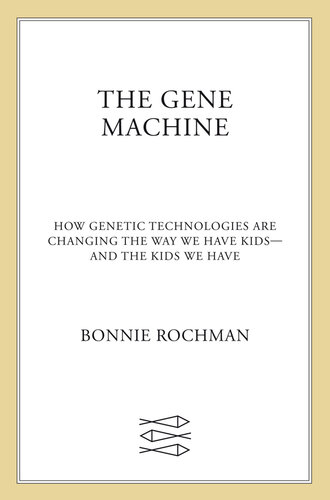
The Gene Machine
How Genetic Technologies Are Changing the Way We Have Kids—and the Kids We Have
چگونه فنآوریهای ژنتیک در حال تغییر روشی هستند که ما از بچهها و کودکانی که داریم داریم.
کتاب های مرتبط
- اطلاعات
- نقد و بررسی
- دیدگاه کاربران
نقد و بررسی

Starred review from January 9, 2017
Journalist Rochman takes a calm, thorough, and nonsensationalist look at core bioethical questions surrounding an array of reproductive health issues as well as the ethical spaces where what can be done and what should be done come into conflict. She clearly and accessibly describes cutting-edge technologies for the general reader without succumbing to faddish, uncritical enthusiasm. Rochman solicits the perspectives of doctors, researchers, legal experts, and families in order to focus on humanist factors, such as how doctors should counsel, how having nonactionable information still affects parental prerogatives, and whether people have a right to an “open future” in light of increasing access to genetic testing. She digs into the toughest topics, including whether using screening results to vet potential quality-of-life factors approaches a new eugenics, if people with such differences as genetic deafness should be able to select for a child with that trait, if gene therapies that turn off genes for Down syndrome should be used on children, and whether parents have a right to test their children and access their data concerning diseases that do not manifest until adulthood. Rochman’s thoughtful take highlights important issues for parenting in an increasingly high-information world.

January 1, 2017
When scientific ability and human desire coalesce into a potent tool that can profoundly change life.As more research is conducted on the human genetic code, scientists, doctors, and parents will have an increasing number of options regarding how this information is used. Beginning with Tay-Sachs, a fatal neurological disease commonly found among Ashkenazi Jews, former Time health and medicine columnist Rochman clearly discusses how genetic screening has helped Jews avoid passing the disease on to their offspring. She also explores the multiple layers of morality and ethics involved in the process of prenatal carrier screening. For those with a definite genetic predisposition to a life-threatening or deadly defect, the testing can provide answers while there is still time to discuss pregnancy or abortion. But what are the options if a fetus is diagnosed with cystic fibrosis, Down syndrome, or a host of other abnormalities? With the use of in vitro fertilization, doctors can implant only those embryos that show no signs of a genetic abnormality, and parents are making decisions about their offspring based on these genetic tests. These are just some of the difficult scenarios Rochman outlines in the narrative, which is full of interviews with doctors, parents, and those in the scientific community. The author also examines the conflicts surrounding the knowledge of potential problems that only manifest later in life, such as Alzheimer's disease--should parents be told their child is predisposed? For some parents, the advance knowledge created a state of anxiety, inhibiting their ability to fully relax and enjoy the many nonafflicted years their child had before them. Knowledge can be power, but as Rochman rightly points out, sometimes the ability to know doesn't mean one should know. Solid research into the dilemmas regarding genetic screening and how it is used for fetuses and newborns.
COPYRIGHT(2017) Kirkus Reviews, ALL RIGHTS RESERVED.

























دیدگاه کاربران